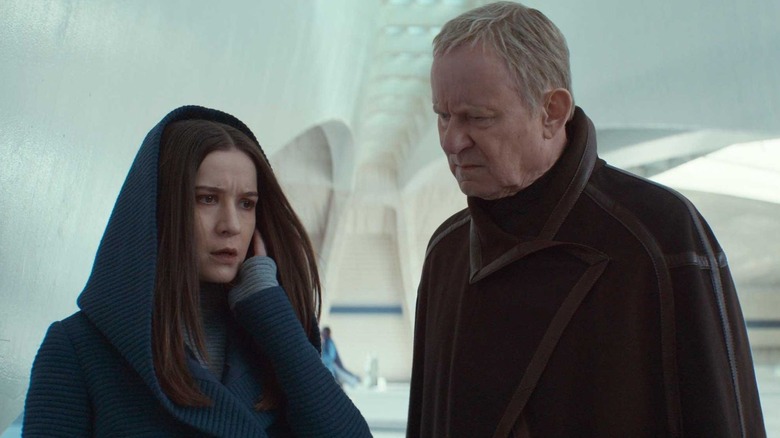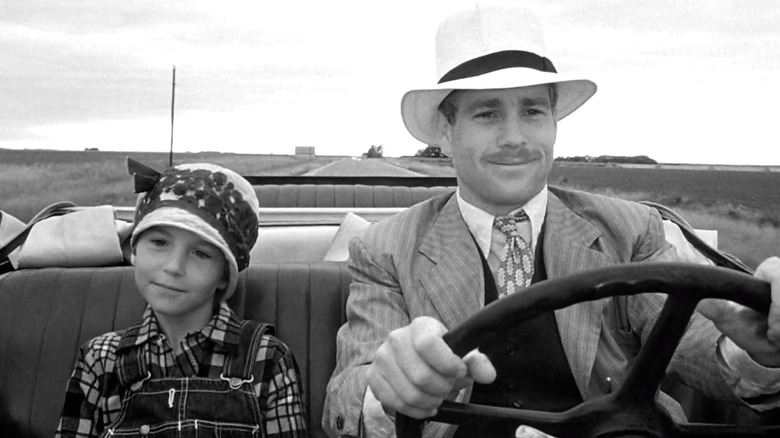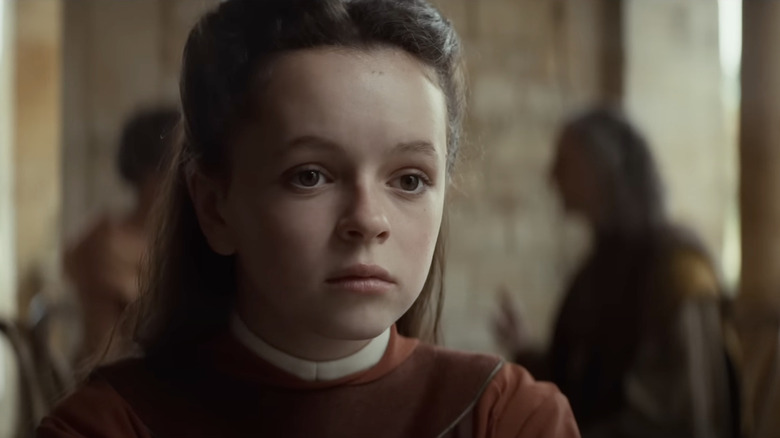The Classic Movie That Inspired Andor's Luthen And Kleya Backstory
We may receive a commission on purchases made from links.
Spoilers for "Andor" to follow.
Now that "Andor" is over, Luthen Rael (Stellan Skarsgård) is likely to go down as one of the show's best creations. The Rebellion Alliance may not want to remember Luthen's legacy in helping to build it, but it's a legacy "Star Wars" fans won't forget. "Star Wars" has been political from the beginning, but "Andor" threads the needle like never before. A lot of that is Luthen's presence; he's a Rebel who feels like an actual revolutionary.
There's no Death Star yet in "Andor," but the Rebels have challenges aplenty — real challenges, like factionalist infighting and compromises for greater goods. Luthen saying in "One Way Out" that "I burn my life to make a sunrise I know I'll never see" is one of the most succinct and beautiful sentiments explaining political resistance I've heard — knowing you won't personally reap the benefits of your actions but still doing them because the world is bigger than you.
To do what Luthen does is a selfless gamble; you're trying to change the world to help people you don't even know, nor will you ever know if you won. And Luthen doesn't; instead, he meets his end in "Andor" season 2, episode 10, "Make It Stop." After he's captured by the Empire, his assistant Kleya Marki (Elizabeth Dulau in her first major role) does what Luthen would want and silences him.
Kleya herself snuck up as one of the best "Andor" characters by the end. Since the beginning, she'd hovered in the background, specifically the back of Luthen's Coruscant antiques shop, but soon made you curious to know more (especially since Dulau proved to be such a natural talent). Kleya is just as ruthless as her boss and, like him, can wear a gregarious mask. The last three episode arc of "Andor" rests on the fulcrum of Luthen and Kleya's relationship, and so we finally learn the origin of their mutual loyalty.
Many years ago, Lear (the man who would become Luthen Rael) was an Imperial soldier. Then he met a girl (April Woods) orphaned by an attack he took part in. That was the breaking point of regret for him, so he deserted and adopted the girl, naming her Kleya. They drifted for several years, building up the resources to become the Rebels we first met them as.
Speaking to The Hollywood Reporter, Dulau said that "Andor" creator Tony Gilroy was pulling from Peter Bogdanovich's 1973 road movie "Paper Moon" for the Luthen/Kleya flashbacks. However, Dulau also found their story to be "so much darker" than that film.
Luthen and Kleya's backstory was inspired by Paper Moon
"Paper Moon" (based on the novel "Addie Pray" by Joe David Brown) is set in 1930s Kansas. It's distinguished by being shot in period-accurate black and white, much like Bogdanovich's previous film, "The Last Picture Show." Ryan O'Neal stars as Moses "Moze" Pray, a con artist posing as a Bible salesman. After his acquaintance and one-time lover Essie Loggins dies, he's tasked with escorting her daughter Addie (O'Neal's real daughter Tatum) to her aunt in Missouri — because while he denies it, Moze is probably Addie's father himself.
They "have the same jaw," as several people note, and, of course, casting a real father and daughter pair in the roles is a telling choice. Though Moze and Addie don't often get along, they develop an undeniable bond, and the crafty-beyond-her-years Addie becomes not only Moze's passenger but also his business partner.
Now 52 years old, "Paper Moon" enjoys a vaunted legacy. It's a bit lighter than contemporary New Hollywood films like "The Godfather" or "Bonnie and Clyde" ("Paper Moon" is a comedy first) but no less excellent. Tatum O'Neal, who was nine-years-old when "Paper Moon" premiered, is the youngest ever Oscar winner for her performance. Every film or series featuring a man and (surrogate) child on the road together, from "A Perfect World" to "Logan" to "The Last of Us" to "The Mandalorian," has some "Paper Moon" in them.
Dulau, when noting the "Paper Moon" comparison Gilroy was going for, stated she finds the relationship between Kleya and Luthen much darker than Addie and Moze:
"Luthen came to Kleya's people, and he had a hand in destroying them all. That day can never be erased. It can never be forgotten. They can't just forgive and forget that; it's too huge an event. So, that darkness stays with them in a way that makes their story quite unique ... What Luthen did to her people all those years ago, or what he contributed to, is horrifying. So, that can never go anywhere, but their love grows incidentally around it."
To continue the comparison: Moze is a philanderer, criminal, and still has a lot to learn about being a father when the credits roll, but it's not like he killed Addie's mother. With Dulau's words in mind, it feels as if Kleya only came to love Luthen because he gave his life over to her revenge. Their bond was forged with the acknowledgement they'd done or experienced horrible things, respectively, and would stop at nothing to achieve justice.
Why Luthen and Kleya could never be father and daughter, explained
The second flashback scene in "Make It Stop" (and the first of Luthen and Kleya on the road) is the most like "Paper Moon." The pair stop in a shop and Luthen, then Kleya, haggle over the price of a machine part they're selling to the shopkeeper. It's no con, but it does show Luthen and Kleya scraping along through opportunism like Moze and Addie did. It gets darker from there because Luthen and Kleya aren't in a road movie comedy. In the next flashback, they see stormtroopers staging a public execution; Luthen leaves, but Kleya forces herself to stay and witness the evil she wants to fight.
The next flashback jumps ahead to when Luthen and Kleya set their lives on fire. Sitting in a restaurant together on Naboo, Luthen wants to enjoy the moment, but Kleya is impatient to begin the struggle. Cue Luthen setting off bombs they planted nearby so they can never go back. (The setting of the scene, though not the meat of it, evokes an early moment in "Paper Moon" where Moze and Addie are at a restaurant together. The latter demands the $200 that Moze extorted from the man who killed Essie in a car accident. Moze tells Addie to enjoy her food to shut her up, while Luthen tells Kleya that to let her have one last taste of peace and stillness.)
In the present, Luthen is no longer around to save Kleya from the dirty work — this time, she has to push the button and then pull the plug. Luthen wouldn't be able to respond to anything she says, so she tells him goodbye with a kiss to his forehead. Kleya is showing affection even as she's technically the one killing Luthen because their bond always had the condition that fighting the Empire comes first. The ending of "Paper Moon" isn't all "sunny side up" (Addie claims to a peeved Moze that she's still only tagging along with him for her $200), but father and daughter do still have each other.
"It was key for me in developing their relationship that [Luthen and Kleya] is not a father-daughter relationship. It's not that tender, heartwarming thing," as Dulau told StarWars.com. With how the relationship begins, unfolds, and ends, it's less like a scrappy father-daughter bond and more like a murder-suicide pact.
"Andor" is streaming on Disney+.


